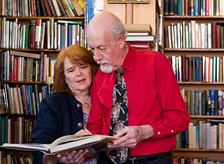The right meds, the right trial, the right time
How one patient navigated the health care arena to benefit from oral chemotherapy

HAIR LOSS
Some of your hair
You might have to part with.
(They must have assumed
That I had some to start with!)”
©2014, James A. Knoop
When Jim Knoop was diagnosed with the skin cancer basal cell carcinoma in 2006, his work insurance covered the costs to have the spots removed. Fast forward to 2012 and his situation was different: no job and no Medicare Part B physician coverage.
He couldn't afford treatments when several more spots appeared on his body. When he visited an area cancer facility, he saw a large, octagonal STOP sign on his paperwork.
"Its meaning was clear," Knoop said. "This patient has no insurance. Go no further with him."
Then, in 2013, a Clinton Township physician referred him to Andrzej Dlugosz, M.D., at the University of Michigan Rogel Cancer Center.
"He and a colleague, Heather Pontasch, M.D., examined me thoroughly, agreeing it appeared to be BCC," Knoop says. "I believe his exact quote was, 'Your timing couldn't have been more perfect.'"
Dlugosz explained that a once-a-day capsule had been approved by the U.S. Food and Drug Administration, and Knoop qualified to participate in a clinical study to examine how the drug, vismodegib, reduced BCC and, in some cases, might eliminate it.
However, Knoop was still left wondering how to pay for his oral cancer medication, which costs around $8,000 a month.
Oral Medication for Cancer Therapy Service
Knoop's need for oral cancer medication came as the Rogel Cancer Center's Oral Medication for Cancer Therapy Service completed its first year, enrolling almost 750 patients.
"We're making sure the patients get their oral chemotherapy medications as quickly as possible without the financial strain," says Nicole Fletcher, financial coordinator for the program. "We screen every oral chemotherapy prescription that is written in the Rogel Cancer Center. We help patients navigate the insurance world and apply for assistance programs via grants and manufacturer-based programs when needed due to high copays or patients with no insurance. We also assist patients with insurance options during open enrollment periods such as Medicare Part D, Medigap and now the Marketplace plans."

In addition to obtaining a month of vismodegib at no cost to Knoop, Fletcher helped him enroll in a prescription drug plan to help cover future expenses.
"I started my medication on Dec. 20, 2013," Knoop says. "My follow up visit was just three weeks later. Dr. Dlugosz seemed astounded at the noticeable improvement in several areas of my body."
A three-way partnership
The Rogel Cancer Center's oral chemotherapy service is a three-way conversation between the pharmacist, financial counselor and patient, says Fletcher.
Rogel Cancer Center pharmacists educate each oral chemotherapy patient about the drugs, how they work and the best ways to prepare for anticancer therapy at home. Once patients obtain their oral medication, they have a very important role in their care.
"Even though you are receiving treatment at home, there are resources available to you for support, coping and managing your cancer treatment," says Shawna Kraft, Pharm.D. "Oral medications have side effects and drug interactions just like IV drugs do. There are many ways we can help to make sure your oral medicine is working as well as possible."
Knoop is optimistic about the positive changes he had almost given up hope of realizing. A writer and novelist in his free time, he has documented his cancer experience and continues working on a novel.
Have a question for the pharmacist? Email us at [email protected].
Jim Knoop, a writer, shares his lighthearted poems about his oral cancer medication.
ODES TO ERIVEDGE
TASTE BUDS
Most ev'rything, its oft been said,
Tastes like chicken (so I've read...)
Forgive this quatrain, penned in haste --
Remind me -- how does chicken taste?
LOSS OF APPETITE
I haven't lost my appetite, Though doctors told me that I might.
It's more a loss of sense of taste,
As I eat cardboard, rope and paste.
So now I fill each bowl and plate
With heaps of great things -- things I hate
But if folks whine of hunger lost,
My advice is, "Weight the cost."
Taste? Or appetite? My answer?
I'll "lose" them all, to "lose" the cancer!
Nutrition
In matters of nutrition
I feel like such a jerk --
If I can't taste these prunes
May I assume that they won't work?
Continue reading the Spring, 2014 issue of Thrive.
